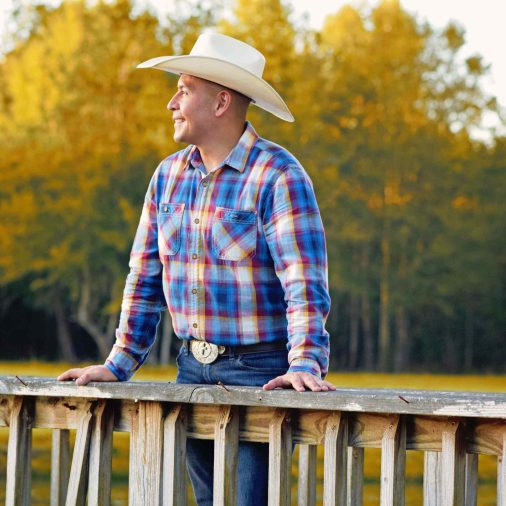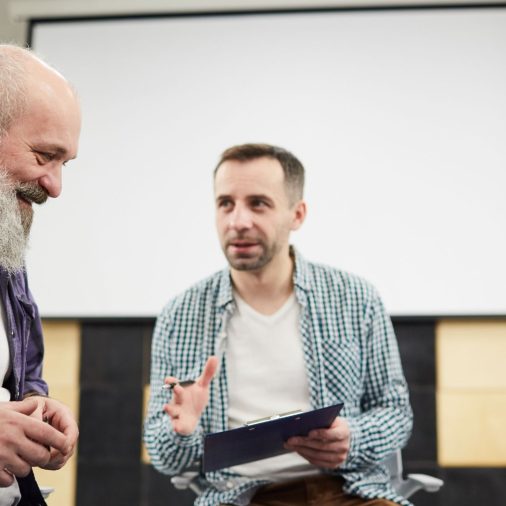Morphine Addiction Treatment Utah
What To Know About Morphine Addiction
Morphine is a powerful opioid often prescribed for pain, but repeated use can cause dependence and addiction. Without proper treatment, morphine abuse can damage your health, relationships, and sense of self.
At Mountain Valley Recovery, we offer a men-only rehab treatment program for morphine addiction. Our approach blends clinical care, life skills training, and a peaceful ranch environment to support long-term recovery and a return to purposeful living.
"*" indicates required fields
EXCELLENTTrustindex verifies that the original source of the review is Google. After several rehabs, and we mean several, our son recently hit the 1 year sober mark. We have our son back and are so grateful. Changing patterns, building healthy habits, developing a good work ethic and finding enjoyment in working, finding confidence, becoming responsible, developing good daily patterns, building good friendships, finding a place in the community,… takes time. Kellie and other staff members at Mountain Valley understand that and do a great job of supporting and guiding the residents in their daily walk. They build friendships with the residents. They show them respect and acceptance and recognize their great potential. They help them recognize that potential by giving them those daily opportunities to work, grow, contribute,… The therapists, also a key part of the program, are excellent. The community is also welcoming, kind, supportive, accepting,… and show friendship. Mountain Valley is what a recovery program truly needs to be in helping residents build a healthy lifestyle pattern. Thank you Kellie and the rest of the staff. So grateful to have our son back. We highly recommend Mountain Valley!!!Posted onTrustindex verifies that the original source of the review is Google. It’s hard to accurately put into words how amazing I think Mountain Valley Recovery is….. But I’m going to do my best. I have spent most of my adult life going from one treatment center to the next and from jail to jail. I have put my heart into recovery before and attended other treatment centers but in the end when I left treatment there were to many things missing and inevitably I relapsed. I was lacking good long term habits. I hadn’t built a work ethic because in all my previous treatment centers we just did therapy or rec therapy all day! Also there several other things that are essential for a fulfilling life that other treatment centers just couldn’t offer. I believe Mountain Valley has beautifully and elegantly found the solution for the deficiencies found in other programs. It is long term and allows you to build healthy habits that are permanent. They offer work with amazing caring people in the community. They offer weekly equine therapy. There are cows and horses on the premises that can be interacted with daily. They offer top notch therapy with excellent therapists. They offer recreational activities from skiing to cabin trips. The staff is compassionate, competent and invested in the success of their residents. They offer independence and responsibility. They allow you to save money and chart your own path with excellent support and guidance to make sure you are where you want to be when you graduate. It is a small town and everybody in the community is 100% behind all the residents. Most of all they offer all there residents a new home. By the time you graduate you feel such a part of the community that it seems almost impossible to leave. And if you to stay after graduation. They are right there to help you stay and put roots down In the community. It is not an easy program but every graduate I have met lead happy stable lives and are forever a part of the community. And for someone who hasn’t felt like I had a real home for a long time that is priceless. I would absolutely encourage anyone to consider what they want long term and understand that most of those things can’t be found in your typical rehabs. If you are ready to change and want to have the best chance of having a fulfilling life that you love. No other rehab can offer you more the Mountain Valley. I have found a home here in Holden, Utah of all places and I don’t see myself leaving anytime soon.Posted onTrustindex verifies that the original source of the review is Google. This is a wonderful and well rounded treatment program. The staff is wonderful and the facilities are great. Beautiful setting away from town with farm and animals. I highly recommend Mountain Valley RecoveryPosted onTrustindex verifies that the original source of the review is Google. Mountain Valley truly changed our family member's life from darkness to light. His life was a total mess & he was depressed. Now he's thriving in a new job & has an amazing positive attitude. Excellent staff & community support.Posted onTrustindex verifies that the original source of the review is Google. After multiple attempts at other rehabs and other avenues, we found Mountain Valley Recovery. We were cautiously optimistic when we sent our son here since we’d been disappointed in the outcome so many times before but after completing their 9 month program, he is clean, sober and will tell you that he’s way happier than he’s ever been or ever thought he could be! The way in which they run this program is perfect. Getting in touch with nature, learning how to be a ranch hand, group and individual therapy, finding faith in God, being taught numerous career skills, going camping and on tons of fun adventures are just a few of the many wonderful things that make MVR the most well-rounded and successful recovery program we’ve been able to find. We will never be able to thank Judd, Kellie, Chet and Joseph enough for all they’ve done for our son. He is a changed man. We highly, highly recommend Mountain Valley Recovery!Posted onTrustindex verifies that the original source of the review is Google. This place will get you where you want to be in life. MVR is a lifesaver. It is a very good tough program but this is the type of program that actually works. No one ever said it would be easy, it’s just worth it! Everything is one day at a time here. They build you up to become a part of society again. All of the employees at MVR are selfless and want nothing but the best for their clients. This place will not only get you sober, it will give you your life back. I wouldn’t recommend any other place to anyone. Judd and Kelly are so caring and will welcome you to their family the second they meet you.if you like therapy from horseback, 11,000 feet up in the mountains then this is the place for you! You will go on unbelievable adventures with Chet and other clients. Chet is an amazing therapist! This place is worth it! God bless!Posted onTrustindex verifies that the original source of the review is Google. I’ve spent the last year at MVR and words can’t express how grateful I am to everyone at the ranch. There are so many things that set mountain valley apart from other places it’s like no other recovery program ive ever been to. It’s changed my life and I feel blessed to have been able to build such a huge structure of fantastic people that I consider family. Much lovePosted onTrustindex verifies that the original source of the review is Google. Words and stars are not enough to convey how truly grateful our family is for the lifesaving and life-changing experiences our son had during his time at MVR. I can think of no better environment for someone to begin the difficult process of healing from the physical, emotional, and spiritual wounds of addiction. The support our son received from the owners, staff, and members of the local community was amazing. They truly care about the men who enter the program. If anyone reading this is struggling with addiction or has a family member struggling with addiction, I wholeheartedly encourage you contact Mountain Valley Recovery.Posted onTrustindex verifies that the original source of the review is Google. If I could give more stars, I would. My family and I are so grateful for the opportunity you gave my son to be his best self. I cannot thank you, the staff and community enough for everything you’ve given him. No doubts at all about how much you all truly care about the men who come to stay at the Ranch…. It’s life changing!Posted onTrustindex verifies that the original source of the review is Google. This program is not for the faint of heart. It is difficult, however you get out what you put into it. I was in bad shape when I got there. They were kind enough to accommodate my health issues I had when I arrived, other programs turned me down. The longer I was sober the better my health got. I'm now once again a contributing member of society with a year sober.
Morphine Addiction Symptoms
Recognizing morphine addiction symptoms early can help prevent long-term damage and improve the chances of recovery. Morphine abuse impacts the mind, body, and relationships.
Watch for these signs:
- Increasing the dose to feel relief
- Using morphine without a medical need
- Strong cravings or withdrawal symptoms
- Neglecting daily responsibilities
- Pulling away from friends or family
- Depression, anger, or mood swings
- Foggy thinking or sleepiness
- Visiting several doctors for more prescriptions
- Ongoing use despite serious consequences
If you or someone you care about is showing these symptoms, reaching out for professional morphine addiction treatment could be a crucial step toward recovery.
What to Expect in Our Inpatient Treatment for Morphine Addiction
Mountain Valley Recovery offers a dedicated inpatient program for morphine addiction treatment, designed specifically for young adult men committed to long-term recovery and personal growth.
- Rehabilitation: Our treatment plan includes individual and group therapy, cognitive-behavioral therapy (CBT), and family therapy. We focus on healing mental health issues and the emotional damage caused by morphine abuse.
- Treatment Duration: Each client’s journey is unique. Our Long-Term Residential Treatment Program allows time and space to fully address the struggles of morphine dependence.
- Holistic Approaches: Through Vocational Programs, Recreation Programs, Faith-Based Programs, and other holistic services, we promote full-person healing beyond clinical care.
- Aftercare & Relapse Prevention: We equip men with the tools to manage cravings, avoid relapse, and transition confidently after morphine treatment ends.
Our Approach to Morphine Addiction Treatment
Our men-only program at Mountain Valley Recovery combines structured therapeutic support with hands-on learning to promote meaningful recovery. On our working ranch in Holden, Utah, clients experience growth through accountability and skill development.
We take a whole-person approach to morphine addiction treatment, addressing the emotional, behavioral, and spiritual aspects of morphine dependence.
FAQ About Our Morphine Addiction Treatment
What are the long-term effects of morphine use?
The long-term effects of morphine can affect both physical and mental health. Chronic use may lead to liver and kidney damage, hormonal imbalances, and a weakened immune system. On a psychological level, prolonged morphine abuse can result in depression, anxiety, and cognitive decline. Long-term use can also damage relationships, careers, and overall quality of life.
What are the most common withdrawal symptoms of morphine?
Withdrawal symptoms of morphine can be intense and uncomfortable, often resembling a severe flu. Common symptoms include muscle aches, nausea, sweating, chills, anxiety, insomnia, and irritability. These symptoms usually begin within 6–12 hours after the last dose and can last for several days. Without support, withdrawal can drive many back to morphine use, making professional treatment essential for success.
Why is morphine addictive even when prescribed?
Morphine is addictive because it directly affects the brain’s reward system, releasing dopamine and creating a sense of euphoria. Over time, the brain begins to rely on morphine to feel normal, which leads to both psychological and physical dependence. Even when used under a doctor’s supervision, prolonged exposure can still result in morphine addiction. This risk increases significantly when dosages are adjusted without medical guidance.
What happens after I complete treatment for morphine addiction?
Recovery doesn’t end when the program does. We help clients build aftercare plans that include relapse prevention, peer support, and access to ongoing counseling. You’ll leave with tools to manage triggers and the confidence to face real-life challenges. Our goal is to ensure long-term success beyond treatment and reduce the risk of returning to morphine abuse.
Can family members be involved in the recovery process?
Yes, we encourage family involvement through scheduled family therapy sessions and regular communication. Addiction affects the whole family, and healing often requires rebuilding trust and improving relationships. We help families learn how to support recovery in healthy, sustainable ways.
Substance Abuse Treatment Programs
Alcohol Addiction Treatment
Alcohol recovery starts today. With our personalized treatment and support, you can rebuild your life and embrace a healthier tomorrow.
Heroin Addiction Treatment
Heroin addiction can feel overwhelming, but recovery is possible. With our expert care, you can heal, rebuild, and reclaim your future.
Fentanyl Addiction Treatment
Fentanyl addiction can be overcome with the right support. Our evidence-based treatments help you break free and regain your strength.
Cocaine Addiction Treatment
Cocaine recovery starts with one step. With our expert care and support, you can break free and create a future full of possibilities.
Meth Addiction Treatment
Meth dependence doesn’t have to hold you back. Our evidence-based treatments help you rebuild a healthy, thriving future.
Opioids Addiction Treatment
Opioid recovery opens the door to a new beginning. Let us help you leave addiction behind and embrace a brighter future.
Xanax Addiction Treatment
Overcoming Xanax addiction is possible. Let our team help you regain your mental clarity and take back control of your future.
Amphetamine Addiction Treatment
Overcoming amphetamine addiction is possible. Let our team support you in restoring clarity and taking back control of your future.
Hallucinogens Addiction Treatment
Breaking free from hallucinogen addiction is possible. Our team is here to help you regain clarity and reclaim control of your future.
Ativan Addiction Treatment
Overcoming ativan addiction is within reach. Let our team help you find clarity, stability, and regain control of your future.
LSD Addiction Treatment
Benzodiazepine Addiction Treatment
MDMA Addiction Treatment
With the right support, MDMA addiction can be overcome. Our evidence-based treatments empower you to heal and reclaim your life.
PCP Addiction Treatment
Adderall Addiction Treatment
Adderall addiction doesn’t have to define your future. Our comprehensive treatment supports lasting recovery and personal growth.
Valium Addiction Treatment
Codeine Addiction Treatment
There’s life beyond Codeine addiction. With compassionate care and proven methods, we help you heal, grow, and take back control.
Morphine Addiction Treatment
Break free from Morphine addiction. Our compassionate team guides you toward recovery, growth, and a renewed sense of purpose.
Marijuana Addiction Treatment
Inhalant Addiction Treatment
Conquer Inhalant addiction. Our supportive team helps you rebuild, recover, and reclaim a healthier, more fulfilling life.
Painkiller Addiction Treatment
Percocet Addiction Treatment
Percocet addiction doesn’t have to control your future. Our tailored care supports lasting recovery and meaningful growth.
OxyContin Addiction Treatment
Kratom Addiction Treatment
K2 and Spice Addiction Treatment
Xylazine Addiction Treatment
CNS Depressants Addiction Treatment
Ketamine Addiction Treatment
Steroid Addiction Treatment
Galaxy Gas Addiction Treatment
Opiate Addiction Treatment







